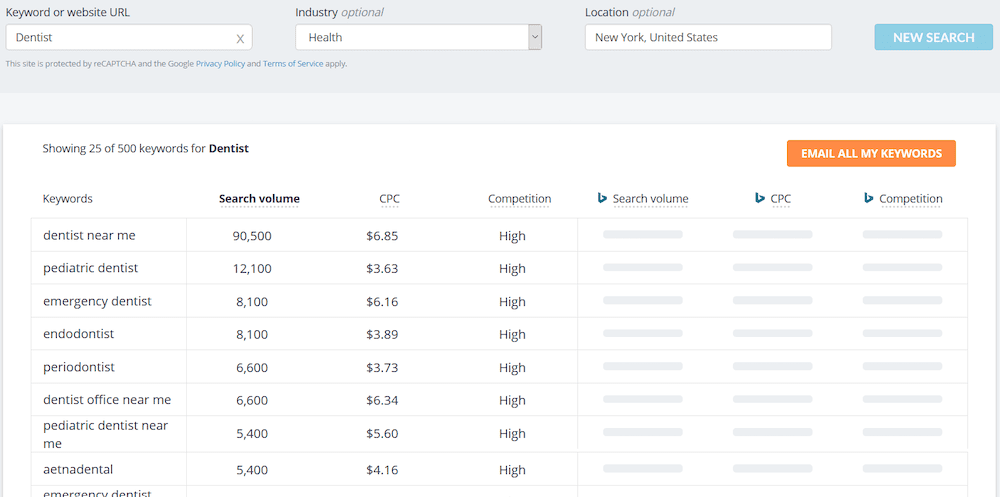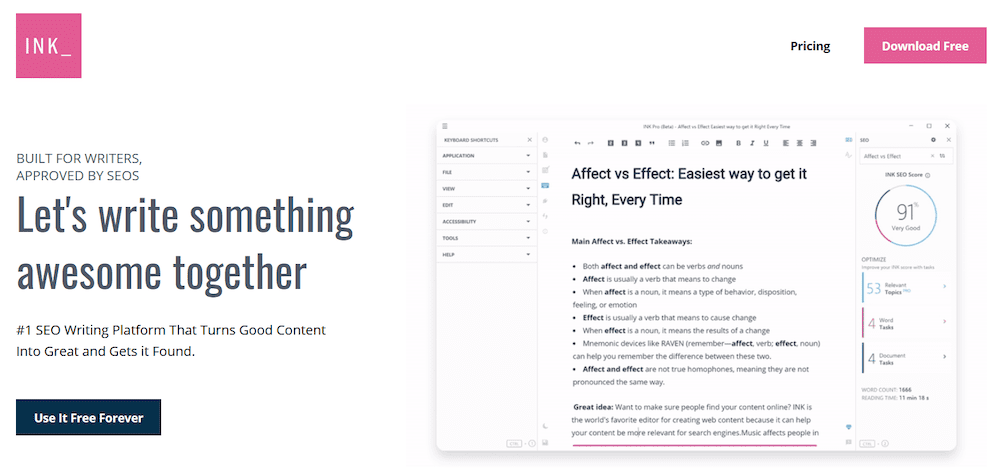As we have seen with the development of social media marketing, the digital landscape is a fertile ground for building a business and maintaining an online presence. Through something called search engine marketing, or SEM, you can have more direct control over your target audience and the likelihood that viewers will see your webpage.
Let’s explore the benefits of search engine marketing, what it can do for your products and services, and why you should learn SEM.
What Is SEM?
SEM is a digital marketing strategy that allows you to market your product by making it more visible online. An effective SEM campaign will increase the chance of your product reaching the first page of Google results.
Through techniques like harnessing keywords, placing PPC ads, and attempting to corner the localized market, SEM is an invaluable tool.
What Is Search Engine Marketing Used For?
SEM is a necessary tool for modern businesses that want to find a target audience and advertise to that group directly.
- Increase visibility. Perhaps the most significant of SEM’s many uses is its ability to increase the visibility of websites, products, and services.
- Appearing higher up on the Google search engine results page. Businesses and professionals do this using keywords, paid search marketing, and other search engine marketing. It is much more complex than simply plugging relevant keywords into the body of the text.
As you’ll see later, there are in-depth SEM strategies that will allow an article, blog, or other content to appear at a higher position in search results.
Types of Search Engine Marketing
There are three main types of SEM. They can be separated into three categories: PPC ads, organic, and local SEO.
Pay-Per-Click
Pay-per-click, or PPC advertising, is the primary SEM strategy used by Google and its affiliates. With PPC ads, advertisers bid on specific keywords, called triggers. An example of a trigger is ‘buying a home’ or ‘learning SEM.’
Advertisers pay to have their page displayed first, or near the top of the search engine’s first page of results. Once the PPC ad is in place, they pay a fee for each click that they get.
Furthermore, Google will give a webpage a Google Quality Score, which determines the overall quality of the page, its keywords, and PPC ads. This affects the cost of the paid search marketing.
With these elements, you can see why PPC campaigns and paid search marketing are incredibly lucrative and competitive SEM strategies.
One significant drawback is that many Internet users disregard the PPC ads they see in their search results.
Local SEO
Local search engine optimization, or SEO, is a much more straightforward way of successfully using SEM. A business using local search engine optimization is aiming to get its products and services at the top of the Google results page. Companies can also use this to get their page to appear along with a Google map.
By aiming to have a map appear in conjunction with the webpage, the search engine results page (SERP) can show the website at any part of the results page with no PPC ads required.
For example, local businesses would harness keywords relating to their specific industry. A gas station would use ‘gas station,’ and a dentist would use ‘dentists.’ The key part of successful local SEO is the proximity of the person searching, hence the word local.
Online reviews also play a big part in whether a business appears on the top of a search results page. The downside to local SEO is that it can take a long time for your business’s page to appear.
However, there tends to be less competition on the local level.
Organic SEO
Organic SEO harnesses organic search results to generate web traffic. Rather than depend on PPC ads or localized results, organic SEO relies on the quality of the content, the number of links, and the structure of the site.
It is considered a success if an organic SEO page appears in the middle of the SERP. Organic SEO pages usually appear under many PPC ads and above more localized SEO pages.
There are quite a few factors that influence the Google standing of an organic SEO page. The most important are:
- The look and feel of the website. Having an attractive website that’s easy to navigate makes it so that Google can sift through your site layout and organize your content.
- The Content on your site. Is the content on your site search engine optimized? It should be, and should also be relevant to the product or service you are selling.
- Links. Including more links on your webpage by backlinking to other pages increases the volume of Web traffic and improves Google searches. There is also the option for link building, which involves hyperlinking to your site.
- Your direct competitors. SEO and SEM are incredibly competitive. As such, creating an aesthetically pleasing website with relevant content will give you an edge over your competition.
Which type of SEO you choose to use will determine how many competitors you will have. A local dentist won’t have the same competition as a dentistry blog.
Usually, organic SEO gets more clicks than PPC advertisements or local SEO. So competition is stiff, and you need to continuously optimize your page to remain near the top of Google searches.
A Quick Note on Negative Keywords
Although they have a somewhat ominous name, negative keywords actually enhance your chances of having specific keywords appear and excluding others. They allow for your page to trigger in a search for a particular phrase.
Instead of leading people to your page, negative keywords will not show up in Google searches in conjunction with other words.
For example, if you don’t want your page to show up when the word ‘pediatric’ is searched, then using it as a negative keyword will exclude your page from anything related to the term ‘pediatric.’
Learning Search Engine Marketing
Luckily, there is an abundance of opportunities to learn search engine marketing.

"Career Karma entered my life when I needed it most and quickly helped me match with a bootcamp. Two months after graduating, I found my dream job that aligned with my values and goals in life!"
Venus, Software Engineer at Rockbot
You can choose to take a certificate course, an online course, or an in-person class.
Let’s look further into what it takes to learn SEM, how long it will take, and the best additional learning resources.
How Long Does It Take to Learn Search Engine Marketing?
SEM is an ever-evolving field, so there isn’t a set timeframe for how long it takes to learn.
Although it depends on the type of marketing you are pursuing, you can expect that it will take around six months to learn SEM. After that, you should have a good foundation in SEM and should be able to use it to help a business become more successful.
You can learn the basics pretty quickly, but it is preferable to have a thorough understanding if you want to make a difference using this powerful type of marketing.
How to Learn Search Engine Marketing: Step-by-Step
Here are the steps you must follow to learn SEM.
- Get familiar with your content. What are you advertising? What products and services are you pushing? Knowing all about the content of the website will allow you to better market it for search engines.
- Know your target audience. Who are you marketing the product to? Is it people in search of jobs? Or people looking for a specific service?
If you know your demographics, you can tailor your material and content to a specific audience.
- Take SEM courses. There are plenty of search engine marketing courses to choose from because it’s an ever-growing strategy. Since Google is the king of search engines, learning how to best use your marketing knowledge alongside Google will benefit you and your business. This is where courses will help.
- Earn an SEM certification. Earning a certificate in an area of search engine marketing is a good idea. This will show hiring managers and companies that you are well-versed in SEM. Earning certification shows dedication and expertise.
The Best SEM Courses and SEM Training
There is no shortage of reliable SEM training and classes. But which are your best options? Due to the effects of the COVID-19 pandemic, many in-person SEM classes have transitioned to remote or online formats. With that in mind, here are the most noteworthy SEM courses and training resources.
Online Search Engine Marketing Courses
Online classes are the way of the future. In this case, you will have immediate and unfettered access to hundreds of options for learning the ins and outs of SEM and SEO.
Search Engine Optimization (SEO) Specialization
- Provider: Coursera
- Time: Five months
- Prerequisites: A few years of business experience
Through a partnership with UC Davis, this impressive Coursera SEM course will have you learning more than merely how to plug in popular keywords.
After five months, students will be able to identify winning marketing strategies and analyze pages to check for effective SEM and SEO. Besides learning how to make a site more visible, students will also earn the work behind effective marketing.
Participants will learn the fundamentals of SEM, apply those fundamentals to website and Google search analysis, and will find out what works and what doesn’t.
While a few years of business experience is required, the prerequisites aren’t concrete, so anyone can join.
Search Engine Marketing (SEM) from an ex-Googler
- Provider: Udemy
- Time: 5 hours
- Prerequisites: Be somewhat familiar with marketing
- Price: $50
What better way to learn the secrets to effective SEM and SEO than from a former expert in Google AdWords?
In this short course, students will learn tricks of the trade and valuable techniques to advance a company’s standing in Google search results, and will be prepared to receive a Google certification.
There are three parts to the course, each with five hours of HD video lectures from Amitabh Verma, the founder of AMP Digital.
Free Search Engine Marketing Classes
What if you’re trying to learn SEM on a budget? There are still many great options.
SEO Training Course by Moz
- Provider: Udemy
- Time: About 3 hours
- Prerequisites: None
- Price: Free
Moz offers this course to help curious marketers learn the very basics of SEM, completely free. Over the three hours of HD video lessons, students will get a crash course in the benefits of SEM.
While it doesn’t offer all the same bonuses as a paid course, this short course is more than enough for anyone curious about SEM digital marketing.
SEM Rush Academy Courses
- Provider: SEM Rush
- Time: Varies
- Prerequisites: None
- Price: Free
The professionals at SEM Rush Academy are masters at finding which keywords will show up the most in the Google search results. In this free course, they will teach you valuable practices that will help boost your business.
Throughout multiple lessons taught by experts, students will learn a ton about search engine marketing and will be able to analyze pages and improve the standing of their business.
Search Engine Marketing Certifications
Remember that getting a certification, especially in a specific SEM program, will allow you to advertise your unique assets in one digital marketing technique. Add your certifications to your LinkedIn profile and resume, and we guarantee it will turn heads.
MIT – Digital Marketing Analytics Certificate
- Provider: MIT
- Time: Six weeks
- Prerequisites: None
Through the MIT Sloan School of Marketing, students will be able to learn valuable marketing strategies to tackle the ever-growing online marketplace. Whether through PPC ads or local and organic SEO, you will come out of this course knowing the best strategies for effective SEM.
Over six modules, students will learn effective search engine marketing strategies, what the future looks like for SEM and SEO, and how you can ensure a steady ROI in digital marketing. In the end, you’ll get an impressive certificate.
Google Ads Certification through Skillshop
What better way to prove your SEM and SEO knowledge than by mastering Google Ads? General knowledge of SEM and SEO is fantastic, but honing your skills in Google Ads will make you intimately familiar with Google search results. You will learn how to tell what your audience is looking for, and how to use Google analytics.
After completing this course, you will need to pass an exam to get your certification. The test is free, and you can retake it as many times as you want. But don’t worry, Google offers excellent training materials to prepare you for the exam.
Online Search Engine Marketing Resources
These online SEM resources will not teach you new SEM concepts. Instead, they are incredibly advanced pieces of software that will help you improve your SEM and SEO skills.
Free Keyword Tool from WordStream

The Free Keyword Tool is a huge help if you are trying to find which keywords are currently the most relevant for any searchable topic. After typing in the industry and location, the Free Keyword Tool will suggest keywords you can add to your SEM strategies that you may not have previously thought of.
For example, if you use organic SEO, in which your site gains the most traffic based on its content and structure, you might start by typing in something simple like ‘dentist.’
While basic keywords like ‘dentistry’ and ‘teeth cleaning’ may pop up, you will also see a whole list of more unique yet competitive keywords that you can try out in your SEM strategies. As you can see above, more localized keywords will appear when searching for the New York area.
This is a great way to find new SEM campaign ideas.
INK for Search Engine Optimization

INK is a very SEO tool. You can write content for articles and blogs, directly in INK. All the while, INK will find related keywords for your material in real-time, giving you more ideas and tailoring your content to ensure that it will show up in Google searches.
Merely enter a keyword in the right column, and search for related topics. There are usually hundreds of keywords and subjects you can choose from. Not only will this help your content appear in the top 10 search results, but it can also show you practical ways to tailor your search engine marketing strategy.
Should You Study Search Engine Marketing?

Learning search engine marketing is an extremely beneficial way to push products and services. There are many courses you can take to get started. Better yet, finish out your course by getting a certification. Then, use some of the great resources available online as you work on developing effective SEM marketing strategies.
About us: Career Karma is a platform designed to help job seekers find, research, and connect with job training programs to advance their careers. Learn about the CK publication.



